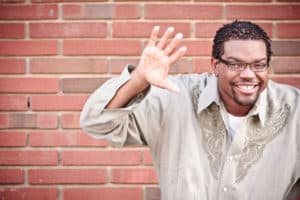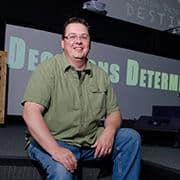Podcast: Play in new window | Download
Subscribe: RSS

I think it’s weird how people name their dogs. I mean, it’s clear that dogs aren’t even aware that they have names.
“Your name is Spot.”
“OK… whatever. Whatever you’re trying to communicate with me is fine. I’ll just keep wagging my tail like this because you seem to enjoy it. Ya got any food?! How do you stand on your back legs for so long like that? That’s really impressive. Ya got any food?!”
“You are Spot.”
“Finger. Pointing. Got it. You seem to want me to wag my tail at your pointed finger.”
I mean, if dogs cared about, or knew their names, we wouldn’t have to worry about whistling after using their name. Yet, we always do.
“Here, Spot! Come here, boy!! (WHISTLE!!)”
“Is he calling me? Well… he whistled, so that must mean he has something for me. The whistle is always for me. The evil cat never responds to his whistle, so it must be for me. And, if he whistles at his wife, she smacks him… so that means he must mean it for me.”
Plus, if dogs actually were aware of their names, I think they’d be pretty disappointed.
“Come here, Boomer!”
“Boomer? That’s the best you could come up with? Is this some sort of weird commentary on my voice? Boomer? I’m more of a Dennis, really.”
Do you really think your dog wants an ironic name, anyway? Too often, I see things like pitbulls named Sugarplumb, or as Riley shared… a cute little pug named Sushi. Sushi? Who would ever want to come back to your house for dinner after seeing your dog named Sushi and your cat named… what… Meatloaf??
I think we should keep it simple and name our dog’s “Dog”. If you have more than one, then your second dog would be named “The Other Dog”. You may think that it’s uncreative to have one name for all dogs, but when you think about it, that’s the way dogs see us – we all have one name: Ruff.
The worst ever was when my cousins gave my uncle a new dog with the worst name ever in the history of housepets. My uncle wants to be nice to his kids and tolerates his new dog’s name. This was fine until the dog escaped from their house and got lost in the neighborhood. So, as the sun is setting on his suburban neighborhood, Uncle Al had to walk through his streets, yelling for his dog… by name, of course:
“Killer! Killer!!! Where are you, Killer? Are you in this nice couple’s backyard, Killer?!”
Next, my incredibly funny friend, Bone Hampton joins the show. Bone has a bone to pick with people who can’t seem to mind their own business. He performs at a lot of secular comedy clubs, and when it’s not appropriate, he refrains from evangelizing from the stage. He simply tells his jokes, and if something he says piques someone’s interest – especially if it’s about the Gospel – he’s more than eager to talk more. But, if you don’t want to have anything to do with Bone’s beliefs… he’ll leave you alone. He’s heard too many people complain about Christians who seem to be throwing Bible verses into peoples’ faces and he doesn’t want to come off as one of “those types of people”.
However, Bone is also a diabetic and he has to be careful about what he eats and drinks. So, when he is at a restaurant, he often orders something like:
- 15 pieces of whatever they’ve got,
- 14 side orders…
- and a Diet Coke.
That’s what he does to make sure his meal is diabetic-friendly.
Yet, the waiters at the restaurant never have any problem “food-evangelizing” to my friend, Bone!
“You know… that Diet Coke is bad for you. It can cause cancer.”
“Excuse me? Aren’t you simply supposed to take my order and bring me my food? I didn’t ask for your counseling on this.”
Yet, if he were to approach anyone and say, “Hey… you know… not going to church is bad for you”… then they’d likely go ballistic on him.
But, no one seems to have a problem with telling him his Diet Coke is bad for him.
Still, Bone tries to remain nice and friendly whenever this type of situation arises.
“Let me tell you something that I know for certain, as a diabetic… If I drink a regular Coke… that’s going to get my foot cut off. You’re just guessing that Diet Coke might give me cancer, but I’m straight up certain that regular Coke will be the death of me. I’m from the South. I was raised on chitins and pig’s feet. My stomach can handle Diet Coke!”
Finally, my dear pal Darrell Dyer calls into the show.
His story isn’t for everyone, especially considering that this show is appropriate for the whole family. This may be too much for young listeners.
Darrell is traveling the country, speaking for schools, churches and other organizations – battling against bullying and school violence through humor and his personal story.
The catalyst that threw him into the world of speaking out against bullying and school violence was the memories of where he came from. Prior to traveling and speaking, he worked as a Youth Pastor at his local church. After working with junior highers for ten years, he gained a clear perspective on how important it is for us adults to not forget our own childhoods and where we came from.
Especially when you had a childhood like Darrell’s.
As a kid, he thought what he was experiencing was common for everyone. So, in the fourth grade, when he confided in a classmate what was going on in his home, he endured a rough twist of events when this buddy of his turned into a bully.
You see, from the time Darrell was eight-to-twelve-years-old, he was molested by several different people, and even raped one time. Yet, as a kid, he didn’t know that life was supposed to be any different.
So, when he finally opened up to his friend, he found himself targeted for the next six years by this bully.
Darrell would fake being sick to avoid going to school – not because he hadn’t studied for a test like most kids, but to escape being blackmailed and verbally abused by his bully. Compared to the mental anguish that Darrell endured for all those years, he practically wished he were physically bullied – at least he could fight back against that. But, he could only sit quietly and take the abuse of the psychological bullying he endured. Every minute of every day, he lived in fear that his bully was going to tell the world about Darrell’s sexual abuse.
So, today, Darrell shares with others how to overcome tragic life stories like his.
One step he talks about is learning how to laugh off the hurt. Oddly enough, it seems that some people who have been hurt the most know how to laugh the most. Maybe it’s because they are starving for an opportunity in life to laugh out loud and let it all out.
It’s also critical for people to learn how to forgive. Now, when Darrell talks about forgiveness, he doesn’t mean “permission for the offender to keep offending their victim”. Rather, it’s arriving at a point where the victim can look at the offender in the eye and ask, “What is it about me you don’t like?” This simple question begins to help the victim free themselves from the prison of bitterness and unforgiveness they find themselves in.
We are all in need of forgiveness for something. Our very sin nature separates us from God and puts us in need of His forgiveness. So, when we can learn to forgive others who do us wrong – just as God has forgiven us – it’s liberating in so many ways!
But, as Darrell puts it, real healing begins when we can actually sit down and start naming the people who have abused us.
He carried around his hurt in silence for 27 years. Yet, he says today that he wouldn’t trade his world for nothing! Of course, he doesn’t wish that he could be abused more than what he endured, but everything that he has gone through has caused him to become the man he is today, with the story he can tell in such a way that he can help people who have gone through similar abuse and bullying, find grace and forgiveness in their lives, and draw close to God.
One key is for young people to receive good, Godly counseling.
As Darrell puts it… it all comes down to a choice: Life or Death. Decisions determine destiny.
The answer to this decision is clear: Life.
It’s within the grasp of everyone. Even those who might believe that death is their free will and choice as a means of escape. So, Darrell encourages people to find their worth, not in their peers, or their past… but in how their Almighty and all-loving Creator views them.
If we look at Joseph’s example in the book of Genesis, even after his brothers abused him, beat him, and sold him off to slavery, when it was all over, Joseph was able to forgive them and speak to them kindly. So, we’re not talking about trusting the bullies again, or rebuilding relationships through reconciliation, but if the victim has truly forgiven their abuser and has released themselves from the prison of unforgiveness, they should be able to at the very least speak kindly to the offender.
That’s when good healing can begin.
You can find out more about Darrell, his story, and how he can come and share with your school or church at DarrelllDyer.com.